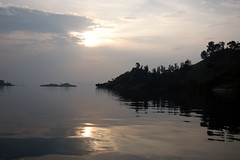 Image by John & Mel Kots via FlickrBy Marcus Gallon
Image by John & Mel Kots via FlickrBy Marcus GallonCreative strategies for energy saving isn't the sole dominion of western nations: Rwanda recently announced their plan to harness volcanic gas from Lake Kivu. While western energy consumers worry over their energy consumption, watching their numbers go up with their smart meter or home energy monitor, Rwandans won't have to fret about any adverse environmental impact from their new life of electricity - the volcanic gas is both inexpensive and totally green.
The gas at Lake Kivu hasn't always been an ally to the two million people living around the lake's shore; until now, it's been an enemy. The locals talk about mazukus, or "evil winds", hard-to-detect pockets of carbon dioxide that kill residents each year. Meanwhile, when the gas isn't busy killing people, it's busy poisoning the lake with more and more methane and carbon dioxide.
An "Exploding Lake"
All the gas in the lake, together with a close-by volcano, makes for an explosive combination. Previously, scientists predicted a dangerous limnic eruption. A limnic eruption is a highly unusual natural disaster, in which a lake releases huge amounts of carbon dioxide at once. The sudden release of gas can kill wild animals, humans, and their livestock by essentially suffocating them. The release can also trigger a tsunami in the lake, causing further damage.
In the 1980s, two other lakes, Monoun and Nyos, experienced a limnic eruption that led to nearly 2,000 deaths. Lake Kivu in Rwanda has been considered a far greater risk, both because its size is gargantuan compared to Lake Nyos, not to mention the population density is much higher. Scientists felt that Lake Kivu was a disaster waiting to happen.
That might no longer be the case, now that locals are putting the gas to good use. By harnessing the volcanic gas in the lake for energy, 60 bn cubic metres of methane have already been extracted, and much more gas stands to still be extracted. Extracting the gas will provide millions of Rwandans with energy while reducing the risk of a natural disaster.
How it Works
A large barge on the lake sucks the water up through a pipe, then separates the water from the methane gas. The methane is further separated from the carbon dioxide, then the methane is used for energy, while the water and carbon dioxide are pumped back into Lake Kivu. So far, so good, but some people are raising concerns about the environmental impact on the lake's ecosystem when the excess water and carbon dioxide are pumped back in.
For the time being, though, the project at Lake Kivu is being hailed as a success. Already, the barge is producing 3.6 MW of electricity, or roughly 4% of the entire country's power supply. In just a few years, the power plant at Lake Kivu expects that it will be able to produce 50 MW, and a US company has signed up to help the effort, aiming to produce 100 MW of energy from the lake's methane.
Article Source: http://EzineArticles.com/?expert=Marcus_Gallon
http://EzineArticles.com/?Volcanic-Gas-to-Power-Rwanda&id=4883674

This is the glossy international version of the story that you are repeating. There are happenings on the lake which don't look like it being such a life-saver and a great success as in this report. The risk is no different, but maybe increased by delay. So far we have only one out of three Rwanada government approved projects has produced some gas. It is not the promised 5MW but maybe a quarter of that. It is expensive power on not yet reliable and we have no cost reduction. A second Rwanda investment project of RIG built by Data Environnement has failed to start successfully and produce the promised 3.6 MW and the same company now is calling for share investors to build another one of 50Mw or 100Mw. A third American project by CGKW is also delayed in financing at present, without the approval of the debt insurance. If these projects are a success the national power supply from lac Kivu would be at least 100mw and cheap. In fact the price remains high at close to US 25 cents per KWh. We are suffering from no delivery of the government's promises of cheap power.
ReplyDelete